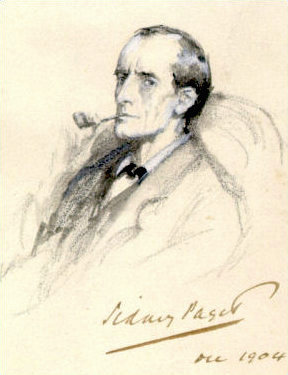
Sherlock Holmes is a fictional detective created by British author Arthur Conan Doyle. Referring to himself as a "consulting detective" in his stories, Holmes is known for his proficiency with observation, deduction, forensic science and logical reasoning that borders on the fantastic, which he employs when investigating cases for a wide variety of clients, including Scotland Yard.

Mycroft Holmes is a fictional character appearing in stories written by Sir Arthur Conan Doyle from 1893 to 1908. The elder brother of detective Sherlock Holmes, he is a government official and a founding member of the Diogenes Club. Mycroft is described as having abilities of deduction and knowledge exceeding even those of his brother, though their practical use is limited by his dislike of fieldwork.
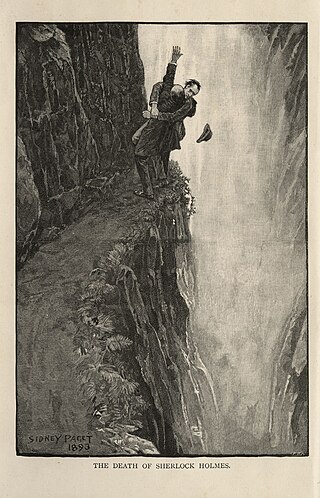
"The Final Problem" is a short story by Sir Arthur Conan Doyle featuring his detective character Sherlock Holmes. It was first published in The Strand Magazine in the United Kingdom, and McClure's in the United States, under the title "The Adventure of the Final Problem" in December 1893. It appears in book form as part of the collection The Memoirs of Sherlock Holmes.

"The Adventure of the Bruce-Partington Plans" is one of the 56 Sherlock Holmes short stories written by Sir Arthur Conan Doyle. It is one of eight stories in the cycle collected as His Last Bow (1917), and is the second and final main appearance of Mycroft Holmes. It was originally published in The Strand Magazine in the United Kingdom and in Collier's in the United States in 1908.
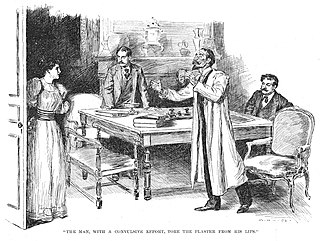
"The Adventure of the Greek Interpreter", one of the 56 Sherlock Holmes short stories written by Sir Arthur Conan Doyle, is one of 12 stories in the cycle collected as The Memoirs of Sherlock Holmes. The story was originally published in The Strand Magazine (UK) and Harper's Weekly (US) in September 1893. This story introduces Holmes's elder brother Mycroft. Doyle ranked "The Greek Interpreter" seventeenth in a list of his nineteen favourite Sherlock Holmes stories.

The Return of Sherlock Holmes is a 1905 collection of 13 Sherlock Holmes stories, originally published in 1903–1904, by British writer Arthur Conan Doyle. The stories were published in the Strand Magazine in Britain and Collier's in the United States.

Sherlock Holmes is the overall title given to the series of Sherlock Holmes adaptations produced by the British television company Granada Television between 24 April 1984 and 11 April 1994.
The stories of Sherlock Holmes by Sir Arthur Conan Doyle have been very popular as adaptations for the stage, and later film, and still later television. The four volumes of the Universal Sherlock Holmes (1995) compiled by Ronald B. De Waal lists over 25,000 Holmes-related productions and products. They include the original writings, "together with the translations of these tales into sixty-three languages, plus Braille and shorthand, the writings about the Writings or higher criticism, writings about Sherlockians and their societies, memorials and memorabilia, games, puzzles and quizzes, phonograph records, audio and video tapes, compact discs, laser discs, ballets, films, musicals, operettas, oratorios, plays, radio and television programs, parodies and pastiches, children's books, cartoons, comics, and a multitude of other items — from advertisements to wine — that have accumulated throughout the world on the two most famous characters in literature."
Many writers make references to Sir Arthur Conan Doyle's famous literary creation, the detective Sherlock Holmes, and these often become embedded within popular culture. While Holmes exists predominantly in the context of Victorian-era London, he has been mentioned in such outre contexts as the 22nd century or hunting aliens or supernatural enemies. These references are in addition to the innumerable passing references to Sherlock Holmes made in many literary and cinematic works, such as the labeling of a person as a "Sherlock", whether in reference to their intelligence.
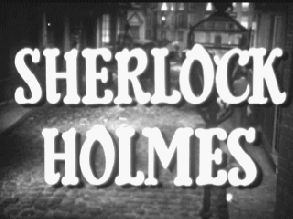
Sherlock Holmes is an American detective television series syndicated in the autumn of 1954, based on the Sherlock Holmes stories of Arthur Conan Doyle. The 39 half-hour mostly original stories were produced by Sheldon Reynolds and filmed in France by Guild Films, starring Ronald Howard as Holmes and H. Marion Crawford as Watson. Archie Duncan appeared in many episodes as Inspector Lestrade. Richard Larke, billed as Kenneth Richards, played Sgt. Wilkins in about fifteen episodes. The series' associate producer, Nicole Milinaire, was one of the first women to attain a senior production role in a television series.
The Sherlockian game is the pastime of attempting to resolve anomalies and clarify implied details about Sherlock Holmes and Dr. Watson from the 56 short stories and four novels that make up the Sherlock Holmes canon by Arthur Conan Doyle. It treats Holmes and Watson as real people and uses aspects of the canonical stories combined with the history of the era of the tales' settings to construct fanciful biographies of the pair.

The Adventures of Sherlock Holmes and Dr. Watson is a 1980 Soviet film adaptation of Arthur Conan Doyle's stories about Sherlock Holmes. It is the second film in The Adventures of Sherlock Holmes and Dr. Watson film series directed by Igor Maslennikov.
This article describes minor characters from the Sherlock Holmes stories by Sir Arthur Conan Doyle, and from non-canonical derived works. The list excludes the titular character as well as Dr. Watson, Professor Moriarty, Inspector Lestrade, Mycroft Holmes, Mrs. Hudson, Irene Adler, Colonel Moran, the Baker Street Irregulars, and characters not significant enough to mention.
Young Sherlock Holmes is a series of young adult thriller novels by British author Andrew Lane featuring Arthur Conan Doyle's detective Sherlock Holmes as a teenager in the 1860s and 70s that is faced with numerous mysteries, crimes and adventures throughout the series.
"A Scandal in Belgravia" is the first episode of the second series of the BBC crime drama series Sherlock, which follows the modern-day adventures of Sherlock Holmes, and was first broadcast by BBC One on 1 January 2012. It was written by co-creator Steven Moffat, and directed by Paul McGuigan. The episode was based on "A Scandal in Bohemia", a short story by Sir Arthur Conan Doyle.
"The Empty Hearse" is the first episode of the third series of the BBC television series Sherlock. It was written by Mark Gatiss and stars Benedict Cumberbatch as Sherlock Holmes, Martin Freeman as Dr John Watson, and Mark Gatiss as Mycroft Holmes. It also marks the first appearance of Amanda Abbington as Mary Morstan and Lars Mikkelsen as Charles Augustus Magnussen.
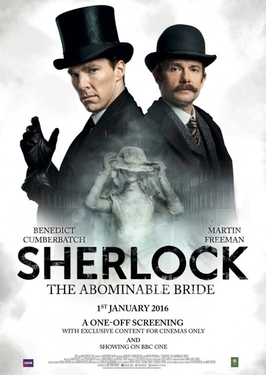
"The Abominable Bride" is a special episode of the British television programme Sherlock. The episode was broadcast on BBC One, PBS and Channel One on 1 January 2016. It depicts the characters of the show in an alternative timeline: the Victorian London setting of the original stories by Arthur Conan Doyle. The title is based on the quote "Ricoletti of the club foot and his abominable wife" from "The Adventure of the Musgrave Ritual" (1893), which refers to a case mentioned by Holmes. The story also draws on elements of original Conan Doyle stories of Holmes such as "The Five Orange Pips" (1891) and "The Final Problem" (1893).
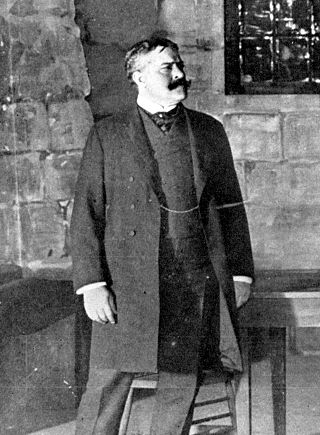
Professor James Moriarty is the fictional archenemy of Sherlock Holmes in some of the stories written by Sir Arthur Conan Doyle. He has appeared in several forms outside of the original stories.











